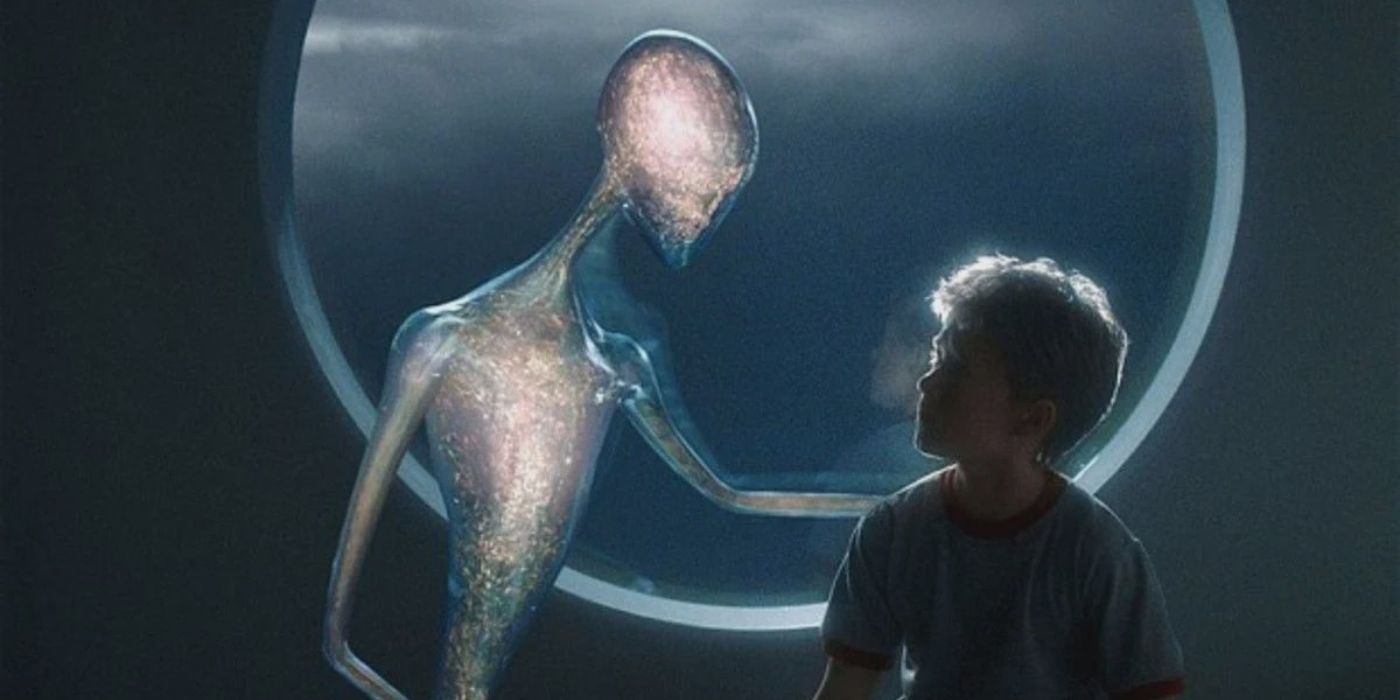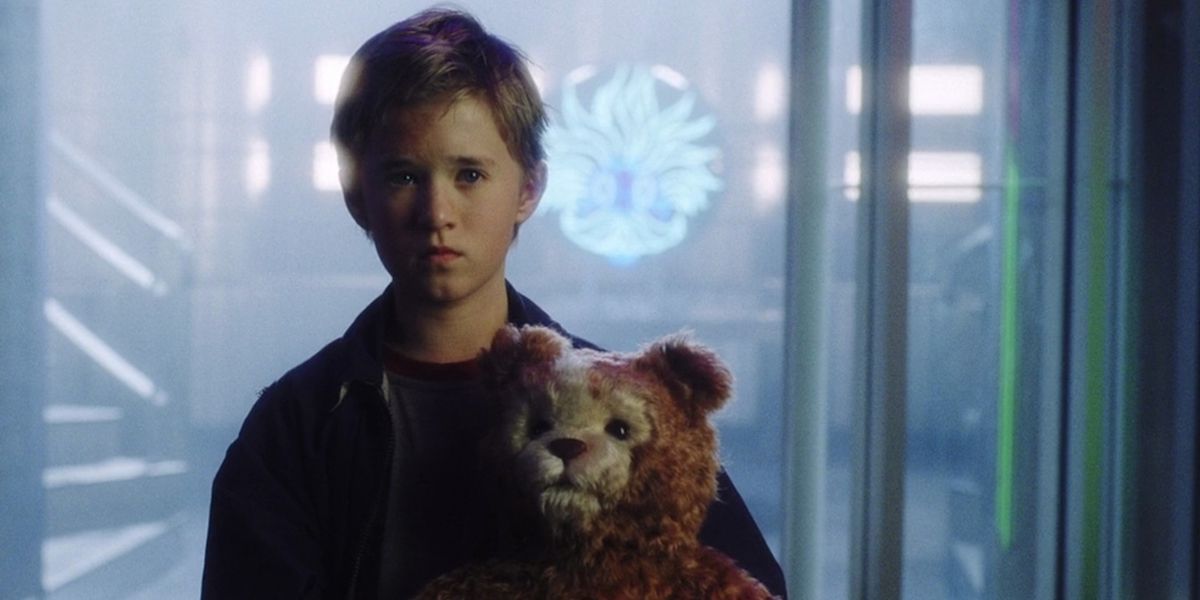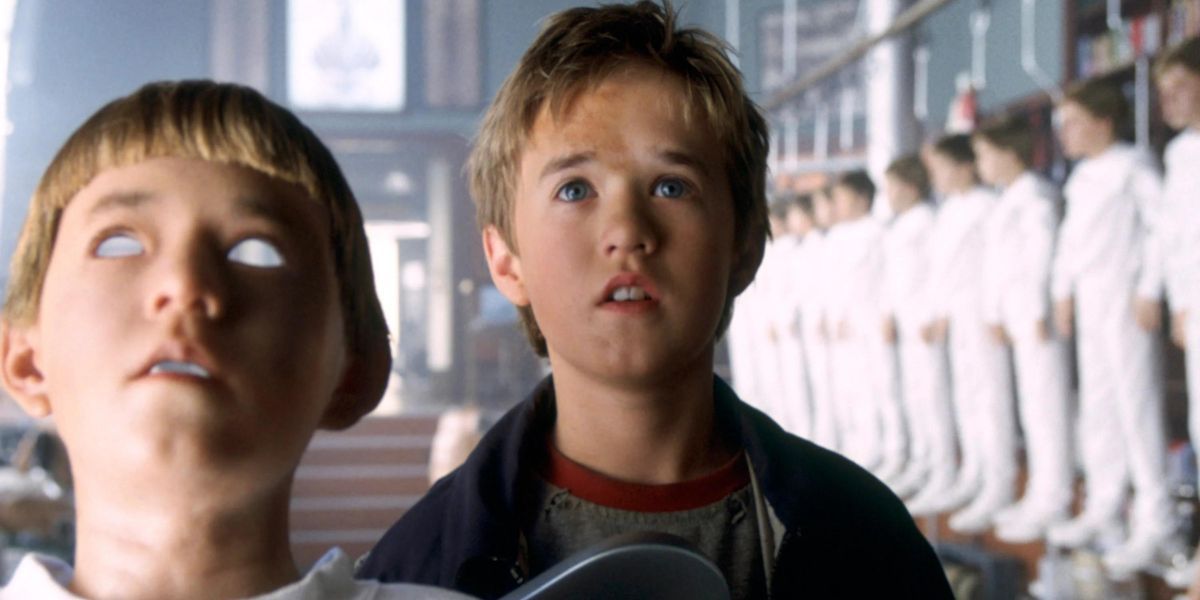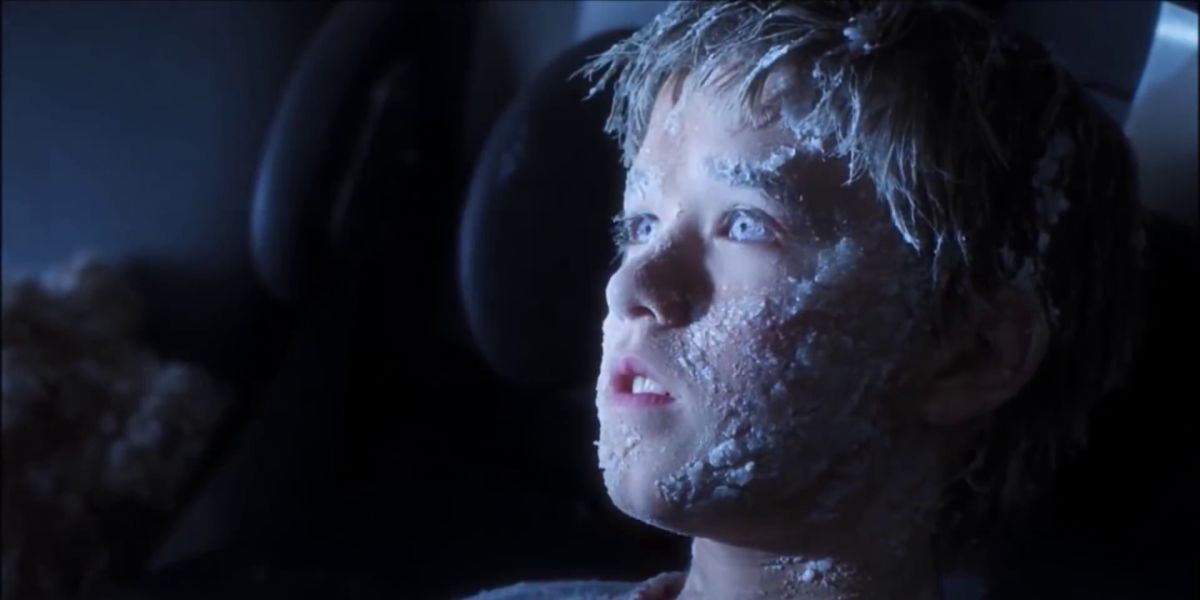At the core of most tales about androids and artificial intelligence lies a variation of the same question: what, if anything, makes these sentient, inorganic beings different from us? Flesh and biology aside, do they possess all that makes us human—are they, in all their hardware and programming, fundamentally the same? Steven Spielberg’s criminally underrated film A.I.: Artificial Intelligence is less concerned with this question than it is with questioning what obligation humans have for their “living” creations. It centers around a mecha (mechanical humanoid robot) named David (Haley Joel Osment) who is uniquely programmed with the ability to love. Stanley Kubrick, who originally conceived of the film and purchased the rights to its source material by Brian Aldiss, saw it as a Pinocchio story. Like Pinocchio, David is a manufactured object that suddenly dreams of becoming human.
There’s no shortage of Pinocchio films. 2022 alone gave audiences two productions of Pinocchio: A CGI-assisted live-action picture by Robert Zemeckis (simply titled Pinocchio), and Guillermo del Toro’s lively stop-motion wonder (also simply titled Pinocchio). The former was a visual spectacle, albeit a lifeless one that had too little to say to warrant its existence. The latter is a technical marvel, a product of love and wonder that places the time-old tale in Fascist Italy. Through varying approaches and tones, filmmakers have toyed with the story for over a century, but few if any are as bold as Kubrick and Spielberg’s reimagining of it into a futuristic sci-fi setting. With its focus on themes such as advanced technology and its consequences, the effects of global warming on society, and the place A.I. has in the future of our species, A.I.: Artificial Intelligence is not just a classic work from two of cinema’s most acclaimed minds: it’s the quintessential Pinocchio story of our time.
The Themes at the Core of 'A.I.: Artificial Intelligence' Are Timely and Urgent
When David first shows up at his adoptive parents in A.I.: Artificial Intelligence, Monica (Frances O’Connor), his mother, is terrified. Her real son Martin (Jake Thomas)—that is, the son of flesh and blood, the one that she birthed—is comatose. There’s something about David that doesn’t feel right to her. It’s not only that she still passionately awaits for Martin to return to life, it’s that David is...just not real. Even if he looks real, he’s uncannily lifelike in a way that makes his lifelessness too apparent to ignore. He’s a cute kid, charming, polite, but apart from the fact that he never breathes or blinks (Osment never blinks on screen) he’s too clearly inhuman for Monica to accept as a son. His behavior is strange and erratic, composing of futile attempts to emulate human behavior with a lack of understanding. He walks in on her in the bathroom, and laughs maniacally at her eating a noodle at dinner. It’s just too strange. That is, until she finally activates the state-of-the-art programming that allows him to love her.
She reads the words that activate David’s programming, and as if a switch is turned on, a circuit connected, David snaps into life. He calls her ‘mommy’ with a tender smile that’s all too believable, then he falls into her arms for a passionate hug. Gifted with love, David might be expected to become more human, more real. Initially, he doesn’t. It’s all too unbelievable. His ‘I love you, mommy’s feel like more like advanced software programming than they do genuine emotion.
It’s difficult to adequately state how fantastic Osment is in his role in A.I.: Artificial Intelligence. He delivers his lines with a stiff formality that feels consistently eerie, but the emotional vulnerability that he leans into during A.I.: Artificial Intelligence's latter half presents a protagonist worth empathizing over. Because of his spring of emotion, David not being human isn’t an obstacle in us caring for him. He’s feeling things, and whether they’re genuine or programming starts to feel less and less important.
What, if anything, does Monica owe David as his would-be mother? She activates the love coded within his programming, so can requiting such love be expected of her? In the middle of A.I.: Artificial Intelligence, when David is abandoned by his mother and left to wander the world and all its mysteries, he encounters a terrifying truth existing just within his reach. Mechas, though without that nifty love thing programmed into them, are treated like trash. They’re collected by an insidious entertainer (Brendon Gleeson), who puts them through a series of sadistic executions for the sake of entertainment at a circus called "Flesh Fair." A fast-talking comic robot (Chris Rock) is shot from a cannon into a spinning propeller, where he’s turned into shreds. Another mecha has boiling oil poured over her, and she smiles compliantly as her skin melts away.
Is it fair for humans to treat A.I. so cruelly? Even if they’re nothing but chips, wires, and electronics, are the mechas and their manufactured feelings unworthy of mercy? With A.I.: Artificial Intelligence, Spielberg seems to suggest that the way we treat the meek is indicative of something greater within us. With the creation of humanoid A.I. beings becoming an increasingly plausible reality, it’s increasingly urgent to ask how such beings should be treated. With abilities to learn, converse, and create art in a manner frightfully similar to our own, it’s not easy to dismiss them purely as machines running computer programs. In the latter half of Spielberg’s A.I.: Artificial Intelligence, could David not very closely pass for a real human child? David is an unfortunate, tragic product: a manufactured boy doomed for a cruel, loveless existence who’s cursed with the ability to recognize the tragedy of it all.
The plot of A.I.: Artificial Intelligence carries out against the backdrop of a world flooded from climate change fallout. Society has changed irreparably, and the entirety of New York is submerged under snowmelt from the poles. That humans continued to persevere through cataclysmic circumstances is an important part of A.I.: Artificial Intelligence, but so is the fact that the technology that advanced far enough to create humanoid androids failed to prevent a world-changing disaster from occurring. It's an apocalyptic premonition, a warning given to a species that still has time to change.
'A.I.: Artificial Intelligence' Transports 'Pinocchio' Into the Age of Technology
Once David becomes increasingly insistent on winning his mother’s love, his behavior becomes increasingly erratic. The unexpected return of Martin complicates things, for not only does the real son have a natural contempt for his manufactured brother, but he apparently also sees the mecha as a threat to his household status.
It soon becomes clear that no matter how much Monica loves David, she can’t and won’t love him as much as she does Martin. To David, this is unacceptable. Is it genuine heartbreak that he feels when he’s ultimately abandoned by his mother deep in the woods, or is it a matter of complying with what his programming requires? It’s not easy to say for sure. The result, however, is the same: David wants to become a real, live boy to finally earn his mother’s love and return to the comfort of his home. He wants real biological life purely because of love.
David is a futuristic Pinocchio of technology and programming. He pushes forward into the unknown, plagued by unforeseen obstacles, in order to find the Blue Fairy that will, according to his belief, turn him into a real boy. Basing his beliefs on Carlo Collodi’s original book The Adventures of Pinocchio, David believes that not only can he become a real boy, but that he will. Like Pinocchio, who doesn't fit in because the humans around him make certain to see him as lesser, David is beset on all sides by prejudice.
Professor Hobby (William Hurt) is David's Geppetto, the creator figure to whom he can owe his existence. In Disney's 1940 animated Pinocchio, Geppetto (Christian Rub) is an elderly toymaker who wishes upon a star that his creation will become real. It's an act of love. It's an act of purity. Professor Hobby, though not malicious, creates David out of scientific wonder. Like the bioengineering scientists in Spielberg's own Jurassic Park, he's focused on the potential far more than the consequences. David's journey is doomed largely because of Hobby's commodification of David—as we see at the start of A.I.: Artificial Intelligence's final act, countless Davids have already been put into production, all of them are identical.
But this David is the one that we know. He was once unique because no other mecha had been programmed to love. Now, mechas capable of love are mass-produced and ready for purchase. David loses his opportunity to become human—exempting the effects of fairy tale magic—through the mass production of these clones. While searching the Blue Fairy, David shows plenty of human-like behavior. He shows fear, determination, perseverance. He isn't a real boy, and he never will be, but he's damn close. The love programmed into him isn't quite enough. It's just an effect of the coding, something that so many others are soon to share.
Its Misunderstood Ending Gives 'A.I.: Artificial Intelligence' a Devastating Punch
Audiences and critics have often derided the ending of A.I.: Artificial Intelligence as being overly sentimental, ruining whatever tone they expected a Kubrick-approved script to have, but to call the film's final moments as anything but particularly depressing is a misinterpretation. After finally discovering a statue of the Blue Fairy hidden underneath the submerged Manhattan, David is crushed underneath amusement park wreckage for 2,000 years. We're told that through that entire time, David never stopped praying to the Fairy to become a boy. Instead, he's frozen in place by a new ice age, and eventually discovered by a race of faceless, silicon-based, hyper-advanced mechas called the Specialists.
David is their only link to the humans that once set forth the motions of their existence. They search his memories for a better understanding of the human race. David's memories—of course—are flooded with images of Monica. He never stopped wanting to return to her, as a real boy, to receive her love. The Specialists observe him and his memories with a detached scientific interest. Have they learned to love, to empathize, or is it once again merely a matter of programming?
They allow David to live in his memory of the home he once shared with Monica. Eventually, they even create a replica of Monica for David to spend 24 short hours with until she expires from a side effect of the Specialists' technology. In David's memory—or this fabrication that the Specialists present him with—David and Monica live in bliss. They act naturally as a mother and son would. They play, they talk, they prepare for bed, until at long last this replicated Monica is set to expire. David accepts. The two go to bed, where they're never to see each other again.
In what critics of A.I.: Artificial Intelligence consider to be its sentimental crutch, Monica tells David that she loves him, that she always has. David, tearfully happy, does what no mecha is capable of: he falls asleep. David dies living in a deluded fantasy that's merely a mercy killing. So begins one of the most crucial philosophical dilemmas of A.I.: Artificial Intelligence. Is Monica's love any less real because it was fabricated by the Specialists? Does the fact that David loves Monica merely because of his programming make his love any less authentic?
David wishes for something that can never be true. He never becomes a real boy because it's simply impossible. He never receives his much-needed love from Monica and is only deluded into thinking he does. Abandoned by the only person he was ever meant to trust, David is left alone in the world with all his pesky feelings.
A.I.: Artificial Intelligence is a masterful rendition of the Pinocchio story that raises one fascinating question after another. It makes us ponder our place in the world and the effect technology may have on it. At the end, though, one question burns hottest: Will we ever create beings like David? If we do, will we ever love them?




